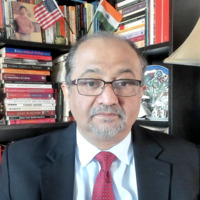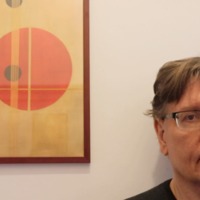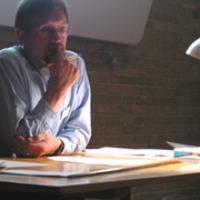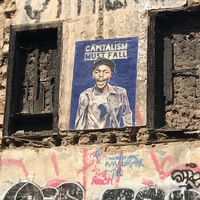Papers by Andreas Folkers

Behemoth : a Journal on Civilisation, Nov 28, 2017
This paper analyses the problem of integrating volatile renewable energies into the electricity s... more This paper analyses the problem of integrating volatile renewable energies into the electricity system from an onto-topological perspective. It introduces the notion onto-topology by engaging with a series of approaches -from STS, Anthropology, Foucault and especially Heidegger -that seek to analyze existing ontologies understood as specific ways of assembling being(s). The onto-topological approach emphasizes ontological pluralism and concentrates on conflicts between intersecting modes of existence. The difficulties in integrating electricity from renewable sources like wind power and photovoltaic into the electricity grid without compromising the grid's stability stem from such a conflict. Whereas conventional power stations produce electricity on demand and therefore make up being as "standing reserve" (Heidegger), volatile renewable energies belong to an ontological constellation characterized by the play of presence and absence. The paper analyses the various technologies for the secure integration of renewables -network expansion, storage, prognosis, informatics -as an equally profane and ontological security dispositive that transforms wind and sun into ubiquitous and continuous presence and thereby secures "the ground" of the modern, techno-capitalist world.
Anthropozän
Springer eBooks, 2023

Smart Grids and Smart Markets: the Promises and Politics of Intelligent Infrastructures
Thinking Infrastructures
The chapter analyses the role of smart grid technology in the German energy transition. Informati... more The chapter analyses the role of smart grid technology in the German energy transition. Information technologies promise to help integrate volatile renewable energies (wind and solar power) into the grid. Yet, the promise of intelligent infrastructures does not only extend to technological infrastructures, but also to market infrastructures. Smart grid technologies underpin and foster the design of a “smart” electricity market, where dispersed energy prosumers can adapt, in real time, to fluctuating price signals that register changes in electricity generation. This could neutralize fluctuations resulting from the increased share of renewables. To critically “think” the promise of smart infrastructure, it is not enough to just focus on digital devices. Rather, it becomes necessary to scrutinize economic assumptions about the “intelligence” of markets and the technopolitics of electricity market design. This chapter will first show the historical trajectory of the technopolitical promise of renewable energy as not only a more sustainable, but also a more democratic alternative to fossil and nuclear power, by looking at the affinities between market liberal and ecological critiques of centralized fossil and nuclear based energy systems. It will then elucidate the co-construction of smart grids and smart markets in the governmental plans for an “electricity market 2.0.” Finally, the chapter will show how smart grid and smart metering technology fosters new forms of economic agency like the domo oeconomicus. Such an economic formatting of smart grid technology, however, forecloses other ecologically prudent and politically progressive ways of constructing and engaging with intelligent infrastructures.

Editorial: Was ist sorgende Sicherheit?
Behemoth : a Journal on Civilisation, 2020
Das Themenheft "Ambivalenzen Sorgender Sicherheit" ist der Versuch, eine neue S... more Das Themenheft "Ambivalenzen Sorgender Sicherheit" ist der Versuch, eine neue Sensibilität für Fragen der Sorge und des Sorgens in die sozial-und kulturwissenschaftliche Sicherheitsforschung einzubringen. Denn obwohl diese Perspektive schon durch die Etymologie des Sicherheitsbegriffs nahegelegt wird, ist sie in der Sicherheitsforschung höchstens in Ansätzen zu finden. Das lateinische securitas, auf das etwa das englische security zurückgeht, lässt sich zunächst als ‚Sorglosigkeit' beziehungsweise ‚Freiheit von Sorge' übersetzen. Dieser semantischen Spur folgend zielt das Themenheft einerseits darauf, den Blick für alternative Traditionen, Praktiken und Verständnisweisen der Sicherheit zu öffnen. Zugleich sollen durch den Fokus auf Sorge auch interdisziplinäre Debatten über ‚care' in die sozialwissenschaftliche Sicherheitsforschung eingebracht werden, die dort bislang kaum oder gar keine Rolle spielten. Das Ziel des Heftes besteht folglich in einer grundbegrifflichen Verschiebung und sachhaltigen Erweiterung gegenwärtiger Debatten über Sicherheit.
Das soziologische Denken im Collège de Sociologie
Soziologische Denkweisen aus Frankreich
In den gender studies verweist der Begriff Biopolitik zumeist auf die Arbeiten von Michel Foucaul... more In den gender studies verweist der Begriff Biopolitik zumeist auf die Arbeiten von Michel Foucault, in denen er untersucht, wie in der Moderne die Organisation von und die Sorge um Leben sowie der menschliche Individualkörper ins Zentrum der Politik rücken. Ergänzend bestimmt er Biomacht als im Gegensatz zu früherer, repressiver Macht, produktiv und auf Lebenssteigerung ausgelegt. Entsprechend impliziert Biopolitik eine ambivalente, ebenso fürsorgliche wie kontrollierende Form der Machtausübung

This article analyses thresholds of catastrophe guiding measures to fight the Covid-19 pandemic a... more This article analyses thresholds of catastrophe guiding measures to fight the Covid-19 pandemic and climate change. It argues that in both cases thresholds express the proposed interaction between the security technologies of prevention and preparedness. Preventive measures are supposed to slow down the infection dynamic and the rise of global temperatures, so that strategies of preparedness are able to cope with the remaining adversities: effectively treating patients and successfully adapting to climate change. The transgression of the catastrophe threshold thus marks the point when crisis dynamics become uncontrollable. The goal is to prevent the unpreparable and to prepare for the unavoidable. A moral economy of life underpins this rationality by providing a backstop against an excess of biopolitical elasticity in setting the threshold. The paper contributes to debates in security studies and the sociology of risk by showing how prevention and preparedness, which are often assum...
Einleitung: Symbiose als Theoriefigur– Fünf Thesen
ZTS Zeitschrift für Theoretische Soziologie, Nov 19, 2020

Symbiosozialität – Zwischen Leben und Gesellschaft
ZTS Zeitschrift für Theoretische Soziologie, Nov 19, 2020
Egal, ob es um die gestörte Beziehung des Menschen zu seinem Mikrobiom, die Auflösung von vitalen... more Egal, ob es um die gestörte Beziehung des Menschen zu seinem Mikrobiom, die Auflösung von vitalen Banden in Ökosystemen oder die Beeinträchtigung des planetarischen Stoffwechsels geht – die Gegenwart ist heute durch eine Krise symbiotischer Beziehungen gekennzeichnet, die sowohl sozial induziert als auch für die Gesellschaft folgenschwer ist. Der vorliegende Aufsatz hat das Ziel, die Soziologie konzeptuell auf diese Problemlage einzustellen. Entwickelt wird eine Theorie symbiotischer Kollektive, die zwei Stränge verbindet: Zum einen erarbeiten wir einen allgemeinen Begriff des Sozialen, der symbiotische Beziehungen zu erfassen vermag. Diese werden im Anschluss an Robert E. Park, Gabriel Tarde und Alfred N. Whitehead als »mehr-als-menschliche« Assoziationsform in räumlicher wie zeitlicher Hinsicht spezifiziert. Zum anderen gilt es, die Historizität der gegenwärtigen Problematisierung des Symbiotischen zu berücksichtigen. Im Anschluss an John Dewey legen wir dar, wie symbiotische Zusammenhänge in der gesellschaftlichen Reflexion sichtbar und bearbeitbar gemacht werden. Erst das erlaubt es, ein historisch situiertes Verständnis dessen zu entwickeln, was wir als Symbiosozialität bezeichnen: eine neue Form der Sozialität, in der das Symbiotische das Soziale informiert und das Soziale Symbiosen modifiziert. Damit plädieren wir für ein Theorieverständnis, das in der Begriffsarbeit die historische Konstitution soziologischer Gegenstandsbereiche mitreflektiert und so in der Lage ist, das Soziale als offenes Prozessgeschehen zu verstehen.

Behemoth : a Journal on Civilisation, 2017
This paper analyses the problem of integrating volatile renewable energies into the electricity s... more This paper analyses the problem of integrating volatile renewable energies into the electricity system from an onto-topological perspective. It introduces the notion onto-topology by engaging with a series of approaches – from STS, Anthropology, Foucault and especially Heidegger – that seek to analyze existing ontologies understood as specific ways of assembling being(s). The onto-topological approach emphasizes ontological pluralism and concentrates on conflicts between intersecting modes of existence. The difficulties in integrating electricity from renewable sources like wind power and photovoltaic into the electricity grid without compromising the grid’s stability stem from such a conflict. Whereas conventional power stations produce electricity on demand and therefore make up being as „standing reserve“ (Heidegger), volatile renewable energies belong to an ontological constellation characterized by the play of presence and absence. The paper analyses the various technologies fo...

Behemoth : a Journal on Civilisation, 2014
Crisis frequently figures as a moment of truth in social science literature. In this paper we set... more Crisis frequently figures as a moment of truth in social science literature. In this paper we set out to challenge this long-standing understanding of the crisis and its connection to truth in both critical as well as positivistic accounts in the social sciences. By engaging with Michel Foucault’s understanding of error and Niklas Luhmann’s concept of irritation, we argue for an alternative or ‘minor’ sociology of crisis. Error and irritation are critical micro-events that disrupt social order and change the mode of perceiving the social. Yet, we want to challenge the idea that this disruptive power elucidates underlying structures of the social. We argue rather that error and irritation are critical moments for the production of truth and can thus become constitutive moments of the social retroactively. By placing erroneous and irritating micro-events at the center of Luhmann’s systems theory and Foucault’s analytics of power, these theories appear as analytical approaches that mai...

Eine Genealogie sorgender Sicherheit: Sorgeregime von der Antike bis zum Anthropozän
Behemoth : a Journal on Civilisation, 2020
This article proposes an alternative genealogy of security by exploring the nexus of security and... more This article proposes an alternative genealogy of security by exploring the nexus of security and care from antiquity to the present. In Greek and Roman antiquity, securitas – literally ‚carefree’ – designated a state of inner peace. With the rise of Christianity, pastoral power introduced a new regime of securing care. The pastoral care for the soul is supposed to secure salvation, whereas Christian Caritas established new forms of care for those in need (Fursorge). Modern biopolitical dispositives of security continued this tradition of care for others with the means of modern welfarism. Security dispositives organized new forms of social care (Sozialfursorge) and became increasingly concerned with the security of supply (Versorgungssicherheit) of vital infrastructural services. Since the second half of the twentieth century, a new form of care for the environment has emerged. The precautionary principle (Vorsorgeprinzip) seeks to prevent irreversible environmental change, whereas...

Die Erde, der Mensch und das Soziale, 2018
Beitrag zur Ad-Hoc-Gruppe »Die Erde, der Mensch und das Soziale: Zur Transformation gesellschaftl... more Beitrag zur Ad-Hoc-Gruppe »Die Erde, der Mensch und das Soziale: Zur Transformation gesellschaftlicher Naturverhältnisse im Anthropozän « Der Begriff "Anthropozän" zur Bezeichnung eines neuen Erdzeitalters, in dem der Mensch zur wichtigsten geologischen Kraft geworden ist, wurde ursprünglich vom Atmosphärenchemiker Paul Crutzen (2002) geprägt. Aber auch in den Sozial-und Kulturwissenschaften ist der Begriff zu einer festen Bezugsgröße geworden. Nicht selten wird dabei der scheinbar harte naturwissenschaftliche Kern des Begriffes zum Anlass genommen, um ansonsten wohl als allzu luftig angesehene Theorien über den Zusammenhang von Natur und Gesellschaft, Geschichts-und Geophilosophie zu "erden" (Chakrabarty 2009; Latour 2015). Darüber besteht jedoch die Gefahr, die problematischen Implikationen des Anthropozänbegriffs zu reproduzieren, anstatt sie kritisch zu hinterfragen. So setzt sich im Konzept des Anthropozäns ein-wenn auch verschämter-humanistischer Narzissmus fort. Auch als selbst bedrohter Zerstörer des Planeten versteht sich der Mensch noch als Herr der Erde, auch im verwüsteten Planeten kann er noch sein Antlitz und seine Signatur erkennen (für eine posthumanistische Kritik des Anthropozänkonzepts siehe ausführlicher: Folkers 2015; Folkers, Marquardt 2017). Zudem besteht die Gefahr, durch einen unkritischen Bezug auf das Anthropozänkonzept dessen Einsatz in politischen Strategien und dessen soziale Effekte zu übersehen. Denn das "Anthropozän" ist nicht nur ein Stichwort in wissenschaftlichen Debatten, sondern längst ein politischer Begriff, der Regierungsprogrammatiken ebenso anleitet wie er soziale Bewegungen inspiriert. Hier setzt dieser Text an, indem er die Realpolitik und die normativen Ordnung des Anthropozäns analysiert. Er macht also keinen soziologischen Gebrauch vom Anthropozän, sondern untersucht dessen sozialen Gebrauch und verschiebt damit die gewohnte Perspektive auf diesen schillernden, neuen Begriff. In diesem Text wird das Anthropozän nicht als neues Erdzeitalter verstanden, sondern als Konjunktur in der Geschichte der Biomacht. Biomacht wird im Anschluss an Michel Foucault und die interdisziplinäre Debatte um Biopolitik (Folkers, Lemke 2014) als eine Form der Macht verstanden, die das Leben nicht nur verwaltet, sondern in einer bestimmten Weise, das Leben, auf das sie sich richtet, als Zielscheibe des Regierens hervorbringt. Die Biomacht ist also nicht nur mit einer bestimmten Art der Politik, sondern auch mit einer historisch spezifischen Seinsordnung, einer "historischen Ontologie" (Foucault 2005: 702), verbunden. Eine solche, historisch-ontologische Perspektive unterläuft den gängigen Blick auf das Anthropozän, indem sie betont, dass der Grund der planetarischen Krise weder "der Mensch" noch "die Erde" ist, sondern eine spezifische Seins-und Machtordnung, die beide Pole als regierbare Größen hervorbringt. Um einen Satz von Foucault (1976: 42) zu paraphrasieren: der Mensch, von dem

Was ist kritisch an Kritischer Infrastruktur? Kriegswichtigkeit, Lebenswichtigkeit, Systemwichtigkeit und die Infrastrukturen der Kritik
Was heißt Kritikalität?, 2018
Der Beitrag stellt die Frage, was „kritisch“ an Kritischer Infrastruktur ist. Dafür unternimmt er... more Der Beitrag stellt die Frage, was „kritisch“ an Kritischer Infrastruktur ist. Dafür unternimmt er einen historischen Streifzug durch unterschiedliche Projekte zur Sicherung der Infrastruktur – Daseinsvorsorge, Schutz Kritischer Infrastruktur, Business Continuity Management – und arbeitet drei Verständnisse von Kritikalität heraus: Kriegswichtigkeit, Lebenswichtigkeit und Systemwichtigkeit. Infrastruktur kann demnach als kritisch für die erfolgreiche Kriegsführung, das Leben der Bevölkerung und für ein Netz von interdependenten sozio-technischen Funktionssystemen (mithin für andere Infrastrukturen) betrachtet werden. Der Text zeigt, dass jedes dieser Kritikalitätsverständnisse zu einem bestimmten historischen Zeitpunkt entstanden ist und für einen gewissen Zeitraum relativ dominant war. Während der beiden Weltkriege stand die Kriegswichtigkeit, nach Ende des zweiten Weltkriegs die Lebenswichtigkeit und seit der Jahrtausendwende steht die Systemwichtigkeit von Infrastrukturen im Vordergrund politischer Bemühungen zum Infrastrukturschutz. Der Text untersucht aber auch eine andere Dimension des Kritischen, nämlich Praktiken der Kritik an vorherrschenden Verständnissen der Kritikalität. Damit zeigt der Text, wie Kritische Infrastrukturen zu Infrastrukturen der Kritik werden können.

European Journal of Social Theory, 2020
This article elucidates the spatial order that underpins the politics of the Anthropocene – the e... more This article elucidates the spatial order that underpins the politics of the Anthropocene – the ecological nomos of the earth – and criticizes its imperial origins and legacies. It provides a critical reading of Carl Schmitt’s spatial thought to not only illuminate the spatio-political ontology but also the violence and usurpations that characterize the Anthropocene condition. The article first shows how with the emergence of the ecological nomos seemingly ‘natural’ spaces like the biosphere and the atmosphere became politically charged. This challenges the modernist separation between natural facts and political norms. It then underlines the imperial origins of this nomos by introducing the concept of air-appropriation understood as the colonization of atmospheric space by CO2 emissions. Instead of assuming that the ecological nomos represents a transition from a colonial to an ecological and cosmopolitan world order, focusing on air-appropriation highlights forms of ecological imp...

Security Dialogue, 2019
This article analyses stockpiling as a security device that hoards time, stores power and buffers... more This article analyses stockpiling as a security device that hoards time, stores power and buffers disruptions. The stockpile is a temporal matter of security by virtue of its ability to freeze time and to prepare for future emergencies. Stockpiling is informed by anticipations of threats but also materially underpins expectations. After unpacking the temporal ontology of stockpiling, the article traces its history as a security device and technology of power. Stockpiling enabled the emergence of the earliest states by establishing the means to store surpluses and centralize power. In modernity, stores became more dispersed as money, commodity exchange and new infrastructures made it possible to procure resources through circulation. In the 20th century, stockpiling became a reflexive security device reactive to risks associated with the disruption of these circulations. Finally, the article illuminates the role of reserves in contemporary German catastrophe preparedness to show that...

Soziale Welt, 2017
Zusammenfassung: Der Artikel geht von der gegenwärtigen sozialwissenschaftlichen Konjunktur des "... more Zusammenfassung: Der Artikel geht von der gegenwärtigen sozialwissenschaftlichen Konjunktur des "Lebens" als Gegenstand und Denkmodell aus. Im Anschluss an Gilles Deleuze und Felix Guattari wird ein Denken der Ökologie vorgestellt, das es erlaubt, soziale Vorgänge in Begriffen des Lebens zu fassen, ohne sich in den essentialistischen und reduktionistischen Fallstricken früherer Biosoziologien zu verfangen. Leben wird von Deleuze und Guattari als ekstatische Fluchtgestalt verstanden, die sich über ein intrikates Gefüge verteilt und nicht in einem einzelnen Lebewesen bzw. dem "Leben selbst" konzentriert ist. Das Denken des Lebens wird so für Hybridisierungsphänomene von biologischen und technologischen, sozialen und natürlichen Entitäten und Prozessen geöffnet. Darin liegt der spezifische Mehrwert dieses Ökologiedenkens für aktuelle sozialwissenschaftliche Debatten. Zum einen wird es möglich, Debatten um Biopolitik von ihrer konzeptuellen und ethischpolitische Verengung auf die Politik des "Lebens selbst" zu lösen und für Politiken des "Lebens jenseits seiner selbst", für Formen von Umweltgouvernementalität und Symbiopolitik, zu sensibilisieren. Zum anderen erlaubt das gewonnene Ökologiekonzept Netzwerk-und (Um)Weltkonzepte zusammenzudenken. Einleitung Leben-Arbeit-Sprache: Michel Foucaults (1974: 426ff) Die Ordnung der Dinge zufolge sind dies die drei Grundmodelle der Humanwissenschaften seit ihrem Entstehen im 19. Jahrhundert. Auch wenn "Arbeit" zunächst das Grundmodell der Sozialwissenschaften bildet, haben doch auch "Leben" und "Sprache" der Soziologie mehr oder weniger stark ihren Stempel aufgedrückt. Es ist in der Tat verführerisch die Geschichte der Soziologie als Abfolge der Dominanz jeweils eines dieser Modelle zu erzählen. Es ließe sich dann am Ende des 19. und zu Beginn des 20. Jahrhunderts eine lebenssoziologische "Evolutionsphase" ausmachen. Autoren wie Auguste Comte, Émile Durkheim, Herbert Spencer und Gabriel Tarde haben versucht, die Soziologie unter Rückgriff auf biologische Denkformen zu initiieren, etwa die Norm und die (soziale) Pathologie bei Durkheim und Comte oder die Evolution bei Spencer und Tarde. Ironischerweise hat so ausgerechnet eine Bezugnahme auf das Leben als Denkmodell-Durkheims Gesellschaftsorganismus-die folgenschwere Austreibung des Lebens als Gegenstand der Soziologie bewirkt. Freilich sind nicht wenige Soziolog_innen von Durkheims Postulat, das Soziale nur durch Soziales zu erklären, abgewichen und haben weiterhin auch auf Phänomene des Lebens Bezug genommen. Das gilt etwa für populationssoziologische Ansätze, die im 19. und frühen 20. Jahrhundert in nicht unerheblichem Maße die Entwicklung der auf populationsstatistische Daten angewiesenen Biologie geprägt haben. Nicht selten hat sich diese Spielart der Lebenssoziologie dem biopolitischen Projekt der Eugenik verschrieben und zwar keineswegs nur und nicht einmal vorwiegend in Deutschland (siehe dazu: Weingart / Kroll / Bayertz 1988) oder lediglich unter dem Vorzeichen des Faschismus. So hat John Maynard Keynes noch 1946 bei der Verleihung der Galton-Medaille an einen eugenisch forschenden Soziologen die Eugenik als "the most important, significant and genuine branch of sociology" 1. 1 Eine frühe Version dieser Gedanken habe ich auf einer Veranstaltung der Sektion Kultursoziologie auf dem DGS-Kongress 2014 in Trier vorgestellt. Ich danke den Organisator_innen des Panels Heike Delitz, Frithjof Nungesser und Robert Seyfert sowie den Anwesenden bei der Veranstaltung für ihre Hinweise und Fragen zu meinem Vortrag. Für hilfreiche Kommentare und Diskussionen des Textes danke ich den beiden anonymen Gutachter_innen sowie Nadine Marquardt, Chris Tedjasukmana, Franziska von Verschuer und last but not least ganz besonders Johannes Wilhelm, mit dem ich die große Freude hatte, über Jahre Deleuze und Guattari zu lesen und zu diskutieren.

Geographica Helvetica, 2018
Kurzfassung. This paper links two strands of Peter Sloterdijk's sphere project-his theory of the ... more Kurzfassung. This paper links two strands of Peter Sloterdijk's sphere project-his theory of the environment and his theory of dwelling-and mobilizes them for an analysis of entanglements between spaces of the environment and the space of the home in contemporary sustainability policies and smart home experiments. First, we retrace how Sloterdijk's topology of the environment combines a historical phenomenological methodology with ecological thinking. In the next step, we discuss Sloterdijk's theory of dwelling, which is closely linked to his thinking of the environment and is central to his conception of a plural spherology, yet has so far largely been overlooked in the reception. Sloterdijk's emphasis on the importance of dwelling in the "world's inner space" ("Weltinnenraum") under conditions of a no longer externalizable environment helps to theorize how humans dwell on this earth in the 21st century. In the third part of the paper, we bring together both themes-environment and dwelling-to analyze contemporary ecological and digital home experiments from the perspective of a plural spherology. By showing how recent digital experiments in "smart homes" entangle spaces of dwelling with environmental concerns we build on Sloterdijk's analysis but also extend it with insights from STS and governmentality studies to better capture the power effects inherent to digitalized dwelling.
Economy and Society, 2017
This paper discusses business continuity management (BCM) and its role in contemporary financial ... more This paper discusses business continuity management (BCM) and its role in contemporary financial institutions. BCM is a nascent disaster preparedness and recovery strategy that seeks to protect vital business operations from disruptions. The paper traces contemporary BCM back to Cold War continuity of government planning, and shows how BCM came to comprehend security as continuity of processes rather than integrity of goods. BCM is prominent in finance because it promises to mitigate operational risks, and it focuses on risks stemming from interdependencies in financial infrastructures. By engaging with two events that triggered continuity management in banks, Hurricane Sandy in New York City and the 'Blockupy' demonstrations in Frankfurt, the paper highlights how BCM is challenged by large-scale disasters as well as acts of public criticism.

Environment and Planning D: Society and Space, 2017
The paper provides a technopolitical analysis of public infrastructure by attending to the ways l... more The paper provides a technopolitical analysis of public infrastructure by attending to the ways large technical systems became a political problem and how the development of infrastructure has inflected biopower, territoriality and security. It seeks to deepen the historical understanding of technopolitics by exploring the concept of Daseinsvorsorge (existential provision), which served as a crucial framework guiding public infrastructure provisions in Germany. Daseinsvorsorge provides a particularly revealing lens through which to examine questions of technopolitics, since it makes it possible to illuminate the dis/continuities in the government of infrastructure between three distinct political regimes: Nazi Germany, the post-war Federal Republic and contemporary Germany. The concept first became operative in post-war Germany, but it had emerged during the Third Reich in the work of Carl Schmitt’s disciple Ernst Forsthoff. Forsthoff identified steps towards Daseinsvorsorge in Nazi...











Uploads
Papers by Andreas Folkers
Der Beitrag beleuchtet die Potentiale und Grenzen des neuen Materialismus für die Soziologie und veranschaulicht seine Argumentation durch Rekurs auf zwei historische Krisenerfahrungen (das Anthropozän und die Atombombe). Abschließend wird die These vertreten, dass der new materialism vor allem als Parasit einen produktiven Beitrag für die Soziologie liefern kann.
In this context, the notions of circulation, metabolism and connectivity occupy a central position. They become the novel ontologies for linking material existence, the social fabric, and the making of knowledge.
In this workshop, we are interested in discussing and exploring this intermingling of ecological epistemologies, visions of control and ontologies of circulation and metabolism. For this purpose, we seek to create a conversation between historians of science on the one hand and anthropologists, sociologists and geographers on the other. Our aim is to link the critical impact of genealogies of circulation and metabolism with contemporary concerns of the environmental humanities.
Eine " reife Wissenschaft " zeichnet sich Deleuze und Guattari zufolge dadurch aus, dass sie ihre eigenen Grundbegriffe hinterfragt. Die Geisteswissenschaften sind reif, wenn sie sich aufs Geistaustreiben verlegen, die Humangeographie, wenn sie den Ausbruch aus dem Raum der Raumwissenschaft vollzieht, die Kulturanthropologie, wenn sie sich vom Bezug auf ein Wesen des Menschen ebenso verabschiedet wie von einem holistisch-homogenisierenden